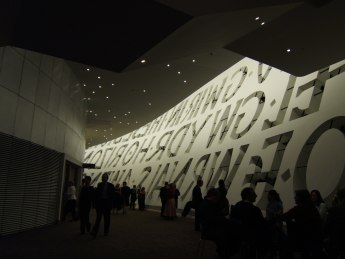La Traviata at the Wales Millenium Centre
18th February 2005


'A dream come true' Carlo Rizzi said in his brief but most telling speech at the end of La Traviata on 18 February - the day WNO finally reached the stage of their own Opera House - though of course we are not allowed to call it that! The Wales Millennium Centre is a gem, with public spaces which excite and enhance the experience plus a large auditorium with arguably the finest acoustic in Britain. I had thought the new Glyndebourne House could not be bettered, and while the two houses are very different I would refuse any offer to choose which I would rather attend to hear any new work.
The only minor problem at the moment is the audience! Those used to coughing or rustling in a woolly acoustic which smothers the sound are here exposed unmercifully. The last act of La Traviata could have been set in a TB ward if one listened to all of the sound produced in the building rather than cutting out the almost continuous bark from everywhere in the house except on stage.
Patrice Caurier and Moshe Leiser gently ignore the tubercular aspects of the opera and concentrate instead on the clash of characters in the face of inevitable death. Nuccia Focile's Violetta is clearly dying - probably from cancer rather than TB - though the death is as intrusive on her life as anything the nineteenth century could have thrown at her. The modern environment for the work is simple yet stylish and focuses heavily on the main characters. Violetta is a model of some sort, drifting through the fashion circuit with its playboy hangers-on and its junkies. Into this world comes a rich but essentially na´ve outsider - Peter Wedd's highly impressive Alfredo - who learns too late the cost of being part of the jet-set.



But most startling of all is Jonathan Summers' magnificent Giorgio Germont. He drifts in during act two, case in hand, like a fish out of water. His family may be rich but his rural background make him uniquely unsettled by everything that Violetta stands for. It is the gradual coming together of these two over the rest of the evening which makes the production so satisfying - musically as well as dramatically.
There are inevitably a number of moments which irritate. The saline drip has become all too present in too many productions - though the sight of Nuccia Focile clinging to the hand basin was uncomfortably effective - and chorus members sniffing cocaine are all too two-a-penny!
But more than any of the strengths, and occasional dips, in the evening was the wonder of the achievement itself. It has taken sixty years to get to this point and many of us seem to have been with WNO for much of that time! All the more fitting then that it should be Carlo Rizzi conducting this first performance and leading the Company on to even greater heights. His achievement as Musical Director has been profound and more than anything else this La Traviata was an ensemble piece of the finest, with all the elements blending together - no stars flying in, no hyped prices - just company music making at its best.




And then came Wozzeck! What other Company anywhere in the world would launch a new Wozzeck as part of its opening season in a new house? But as ever the risk paid off. Richard Jones' stark production is if anything even more depressing than most other productions I can recall. For most of the first two acts we suffer with Wozzeck as he slides every deeper into despair and depression, but then something strange happens. The scoring of the Third Act is so sympathetic and almost romantic in tone that it is impossible not to be moved. Gun-Brit Barkmin is not a sympathetic Marie yet her reading of the Bible in the last act is devastatingly moving. We suddenly see a warmth and potential for her which has deliberately been suppressed earlier in the evening. But it is too late and Christopher Purves' Wozzeck, driven way over the top by the rest of an uncaring society, takes his revenge as an act of power rather than violence. He dies in a vast orange skip which has become increasingly present as the evening progresses. Clive Bayley's Doctor and Peter Svensson's Drum-Major are all too credible in a society which treats workers as less than animal. The boy - played older and more knowing than is often the case - ends up taking Wozzeck's place as the bean taster. It is a devastating if inevitable ending. What hope is there for a child raised in these circumstances?
Yes it is a depressing evening, but somehow it manages to say more about the reality of the human condition than most romantic works. And then of course there is the orchestra under Vladimir Jurowski playing like angels and making the score seem lucid and at times almost easy on the ear. Jurowski does not over-romanticise but in the wondrous acoustic of the WMC we are able to hear single lines with clarity and even the most dynamic sections remain clean and terrifying.
I can't pretend to enjoy Wozzeck any more than I do King Lear but I am very glad that we can experience the work regularly in performances of such impact and musical quality.
BH
Further performances of both works in Milton Keynes, Southampton, Birmingham, Liverpool and Bristol. The season also includes a revival of Cav & Pag with Dennis O'Neill. Details of all performances are on the WNO website: www.wno.org.uk.
